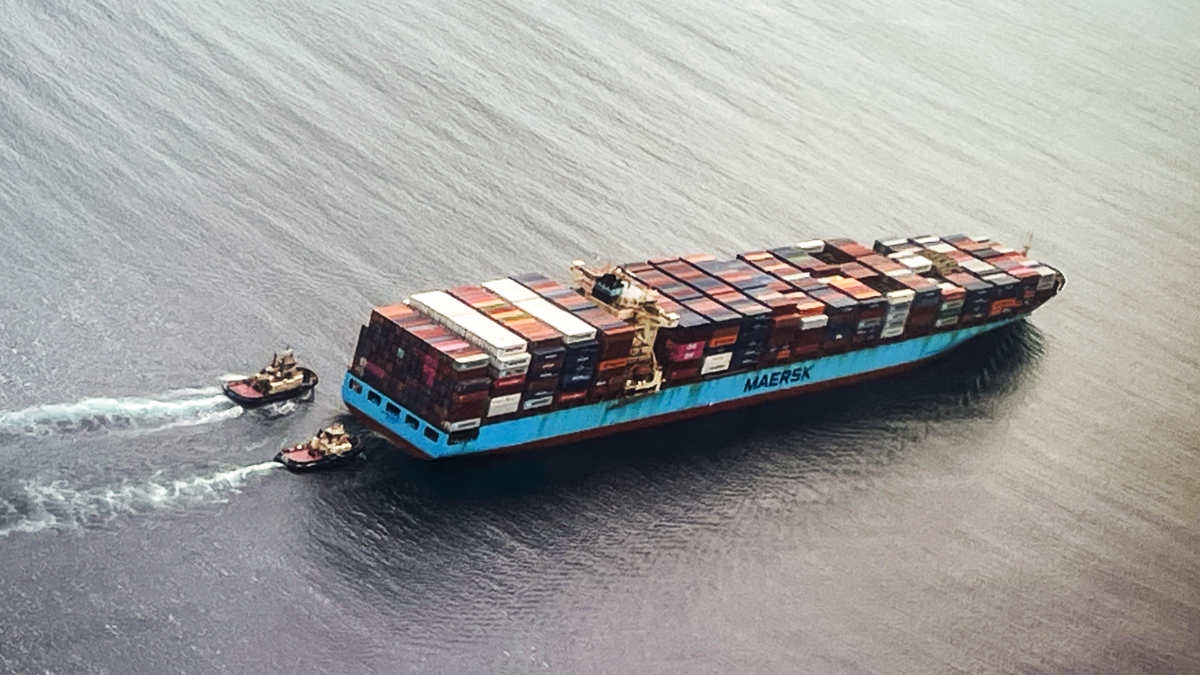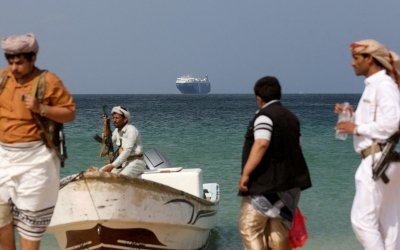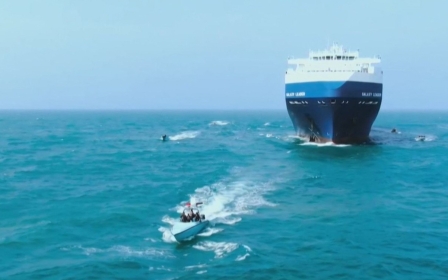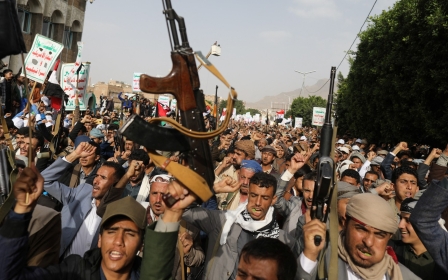War on Gaza: Stock prices of shipping companies are soaring because of Houthi attacks

The Israeli container shipping company ZIM isn't feeling a lot of love in the Middle East today.
Yemen's Houthi rebels have vowed to target Israeli-linked ships with ballistic missiles and drones and ZIM has been forced to divert its vessels from the Red Sea to a more arduous journey around Africa to avoid attacks.
It's a development that should have rattled its stock price, but instead, pickers are loving the tense geo-political situation.
ZIM's share price is up a whopping 50 percent since attacks against vessels in the Red Sea intensified last month. And it isn’t alone.
Shares of Maersk, the Danish shipping giant operating more than 700 vessels, are up about 20 percent in the last month, while German company Hapag-Lloy - the world’s fifth-largest container shipping group - is up 17 percent.
New MEE newsletter: Jerusalem Dispatch
Sign up to get the latest insights and analysis on Israel-Palestine, alongside Turkey Unpacked and other MEE newsletters
The US says Yemen's Houthis have launched more than 100 drone and missile attacks on 10 commercial vessels in the Red Sea.
The Houthis, however, say they are only striking Israeli-linked vessels in response to the war in Gaza, but some with little or no ties to Israel have been hit.
By attacking vessels in a key trade choke point, the Houthis, a once ragtag group of fighters that captured Yemen's capital in 2014 and fought their Arab neighbours to a standstill in a brutal civil war, are boosting shipping companies' bottom lines and powering their stocks.
'Houthis increase profitability'
The Red Sea sits between the Bab al-Mandab Strait in the south and the Suez Canal in the north. It accounts for 12 percent of global trade, including 30 percent of all container ship traffic.
Vessels that avoid the waterway and ply trade between the east and west have to take the more circuitous route around the Cape of Good Hope in Africa.
Maersk, ZIM, and Hapag-Lloyd have joined other container ship companies diverting in recent weeks.
"For them, this is going to deliver increased profitability that they didn't expect to have,” Michelle Wiese Bockmann, a senior shipping analyst at Lloyd’s List Intelligence, told Middle East Eye.
"The longer they have to divert, the higher their freight rates. They are definitely winners."
'This is going to deliver increased profitability'
- Michelle Wiese Bockmann, Lloyd's List Intelligence
Shipping is a notoriously murky industry.
Fuel, household items, and food are ferried across the oceans by tight-knit Greek shipping families or behemoth vessel operators from China.
At times of conflict, shipping firms can make handsome profits by transporting goods such as sanctioned Russian or Iranian fuel.
But the Houthi attacks are boosting shipping bottom lines for simple reasons. Travelling between Asia and Europe via the Cape of Good Hope - instead of the Red Sea - can add two weeks to a vessel's journey, and cost $1m more in fuel per round trip, Peter Sand, a chief analyst at Xeneta, a shipping market analytics firm, told MEE.
Companies pass those costs on to consumers, sneaking in extra profit along the way, Sand says.
The price to ship a container from China to the Mediterranean has already surged 44 percent this month to $2,413, according to freight booking and payments platform, Freightos.
"Every time supply chains get disrupted, shipping rates go up. And they go up more than costs," Sand said. "Who benefits from higher rates? Ship operators and owners. Everyone else pays the bill, the owners of cargo and consumers."
Freight rates are also moving up because sending vessels around the Cape of Good Hope takes longer, reducing the supply of available ships on the market, at a time when demand remains unchanged.
"Cumulatively the attacks tie up more ships. So the ships not being utilised are going to find employment. The rate they can charge on the spot market is going to increase," Bockmann, at Lloyd's List Intelligence, told MEE.
Shipping companies and vessel owners made record profits during the pandemic because of the high demand for goods and supply chain bottlenecks.
Container ship operators in particular stocked up on massive orders of new vessels.
But the pandemic boom has faded with freight rates sinking around 90 percent. If the Houthi attacks persist, more ships will be needed to do the same amount of work as before, offering a reprieve to shipping companies at a time when rates are under pressure.
Golden age of shipping
The shipping industry is divided among owners who charter out their vessels and operators who charge freight rates.
Many, like Mediterranean Shipping Company, the world's largest container shipping company, both own and operate their vessels.
The complex structure of the shipping industry is one of the factors that has made it difficult for the Houthis to target Israeli ships.
On Monday, the Norwegian owner of a vessel attacked by the Houthis said the group had relied on incorrect industry trade data to attack its vessel over false links to Israel.
The Houthi attacks strike at the core of US power projection in the region: protecting sea lines of communication.
Last week, the US announced details of a new 10-nation task force to defend against Houthi attacks.
During the Iran-Iraq war in the 1980s, US warships escorted oil tankers through the Gulf region.
The Israeli-Palestinian conflict has impacted shipping in the Red Sea before. Egypt closed the Suez Canal at the outbreak of the 1967 war, only reopening it eight years later in 1975.
"If you go back to the 1967 war when the Suez Canal was shut, rates skyrocketed. That was a golden age for shipping. This was the era of Aristotle Onassis when Greek ship owners made tons of money," John Kartsonas, the Managing Partner of Breakwave Advisors, told MEE.
While the Houthi attacks are making headlines, Kartsonas said it was "too early" to see a meaningful impact on shipping. He also said that any industry gain would come at a time when freight rates are at "rock bottom".
"If the Red Sea becomes an area where ships can’t transit for months on end, then you are talking about a favorable environment for vessel owners and shipping companies," he said.
Day traders and the Houthis
The Houthi attacks haven't been felt evenly across the industry, underscoring the geopolitical factors at play and market fundamentals.
The shipping sector benefiting the most from rising freight rates is container shipping, particularly Asian companies.
The Red Sea is the fastest route for products traveling between Asia and Europe.
Bockmann said that carriers dedicated to transporting cars are particularly alert to the Houthi threat, diverting around Africa to protect their "high-value cargo".
"You have to look at what companies use the Suez Canal the most," Kartsonas said. "Companies moving container boxes will benefit from rising freight rates, followed by tankers moving oil and jet fuel."
Nine percent of global crude oil and petroleum products pass through the Bab-al Mandab. The Red Sea is dotted with Suez-Max and Aframax tankers which are small enough to transit through the Suez Canal to the north.
But vessels carrying oil haven’t diverted like container ships.
A big chunk of the oil moving through the Bab-al Mandab is Russian, transported by a shadow fleet of tankers whose owners may be unperturbed by the Houthi threat, experts say.
They told MEE that the Iranian-backed Houthis are unlikely to target Russian-linked vessels given Moscow’s cozy ties to Tehran.
But some stock traders may be inspired more by the Houthi attacks themselves than by shipping industry details.
For example, Breakwave's Dry Bulk Shipping ETF, BDRY, which tracks the daily price of freight futures for unpackaged dry cargo, such as iron ore, coal, and grain is up 50 percent in the last month.
But the fund isn't heavily focused on freight rates in the Red Sea, Kartsonas from Breakwave, told MEE.
He added that for the shipping industry overall, a now monthslong congestion at the Panama Canal has been "more impactful," than Houthi attacks even if it is "less exciting".
Bockmann, at Lloyd's List Intelligence, said wild stock market moves as a result of the Houthi attacks may simply be "day traders making money".
"The volumes and volatility we see in stock markets during a geopolitical crisis often have very little relationship to the shipping fundamentals," she said.
Middle East Eye delivers independent and unrivalled coverage and analysis of the Middle East, North Africa and beyond. To learn more about republishing this content and the associated fees, please fill out this form. More about MEE can be found here.






